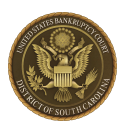The Judges have recently noticed that the procedure followed during the consent/dispute docket has begun to vary from that set forth in the Chambers' Guidelines. Therefore we would like to remind the members of the bar of several of the Court's requirements, which are more fully set forth in those Guidelines: 1. Absent approval from chambers, the Trustee may only continue matters under his/her discretion one time for a maximum of a month, from a consent docket to the next consent docket. The hearing following any continuance should be on a dispute day with a joint statement of dispute being filed, unless otherwise excused by chambers. Requests for longer continuances should be by motion with a proposed order or requested during a hearing before the judge. 2. Hearings on matters set or continued by chambers by order or letter (as opposed to scheduling done by parties) on the consent day may not be continued or removed by the Trustee without the approval of the court. 3. Counsel may only be excused on the consent day if there are no outstanding issues with the Trustee or with any other party. In that event, the Trustee's recommendation would likely be either confirmation or a CI order. Counsel should attend if sufficient information has not been provided to the Trustee to complete his/her recommendation at the time of the hearing. In regards to objections by other parties, counsel should attend unless the issues are fully resolved and one counsel or the Trustee is reporting that resolution on the record. 4. Disputed matters require a joint statement of dispute unless excused by chambers which is often done on routine confirmation issues between the Trustee and the debtor, such as a failure to file necessary information or feasibility issues being raised by the Trustee. The requirement of a joint statement of dispute is particularly helpful on Reform Act issues or issues being litigated between private parties. It is important that parties complete the joint statement in full, setting forth all relevant facts, arguments, and case law. Absent removal of a matter from the calendar or the parties being excused by chambers, counsel and the debtor should attend the hearing scheduled on the dispute calendar. The Judges appreciate the bar's attention to these procedures.
Wed, 05/21/2008 - 5:00am
